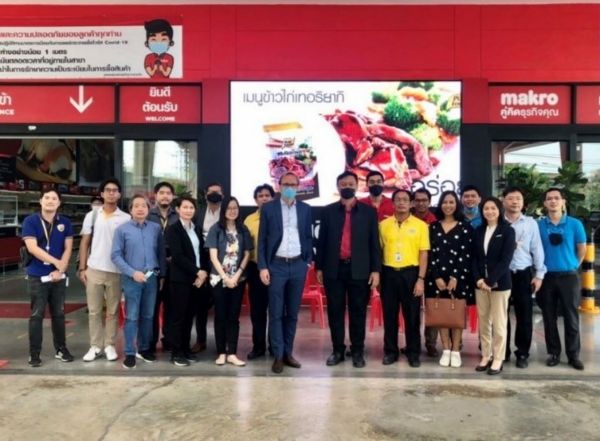Thai RAC: The Race to Zero – Triggering a Green Cooling Transition

The photo shows a visit of GIZ, EGAT, ONEP and AEP (a consultancy) to Siam Makro Plc. (Makro),
a leading supermarket chain in Thailand and under the Charoen Pokphand (CP) Group, which has already opted
partially for natural refrigerants and is planning a pilot branch with 100% green cooling technologies.
Makro has joined the race to net zero, committing to achieve zero emissions by 2030.
The Covid-19 crisis presents an opportunity for impacted companies to grow back greener.
Corporations and governments around the world are prioritising climate actions in their recovery from the Covid-19 pandemic. Many are pursuing net zero emissions instead of pursuing business as usual.
Representatives of several large Thai companies have recently come forward to highlight their commitment to the race for net zero carbon emissions. These include C.P. Group, and Siam Makro Plc. The supermarket chain Makro Plc is currently looking to invest in green cooling technologies in its new branches, specifically, larger-scale water-loop systems for its chilled display cases.
Between October and December 2020, the Thailand RAC NAMA project and its partners have held almost 20 bilateral meetings with a number of leading corporates in key sectors such as food retail, restaurants, hotels and hospitals, to increase their awareness of green cooling technologies, and the business case behind it.
For corporate users, equipment cost is not the only deciding factor: lifetime cost, energy cost savings, reliability, serviceability and the availability of products from multiple suppliers are much more influencing their business decisions.
Nowadays, the use of refrigeration and air-conditioning (RAC) technologies in Thailand account for approximately 50% of the electricity consumed, with the RAC sector among one of the largest greenhouse gas emitters.
The pandemic has highlighted the role of the cooling industry to bring clean, efficient, and sustainable technologies to the market. With major multinational corporates either mandating or advising the use of low-carbon-footprint equipment, market acceptance for green cooling technologies is set to grow further.
With more and more corporates having pledged to reduce their environmental and carbon footprint, green cooling technologies are becoming an even more attractive technology option. With negligible Global Warming Potential (GWP) and Ozone Depletion Potential (ODP), natural refrigerant-based systems also consume 5-25% less energy due to its excellent heat transfer properties.
Read more about the Thailand RAC NAMA project.
The Thai government, together with the governments across the globe, has set ambitious goals to achieve 20 – 25% of greenhouse gas reduction by 2030. To meet the new regulations that will ultimately lead to the phasing out of synthetic refrigerants, shifting to natural alternatives such as hydrocarbons with negligible GDP and Ozone Depletion Potential is the only way forward.
To support this transition, the Thailand RAC NAMA project has partnered with the Office of Natural Resources and Environmental Policy and Planning (ONEP), the Department of Alternative Energy Department and Efficiency (DEDE) and the Electricity Generating Authoring of Thailand (EGAT) as well as Thai industries to transfer technology and know-how on ozone and climate-friendly technology and financial support to the private sector, as well as provide policy and technical advice to relevant government agencies. The RAC NAMA Fund, a financial facility under the management of EGAT, has initiated a transformation in the Thai refrigeration and air-conditioning (RAC) sector towards the use of climate-friendly and energy-efficient cooling technologies with natural refrigerants. Through this close partnership with government and private sector, emissions are expected to reduce by 0.94 MtCO2eq annually. The project runs from April 2016 until July 2021.
